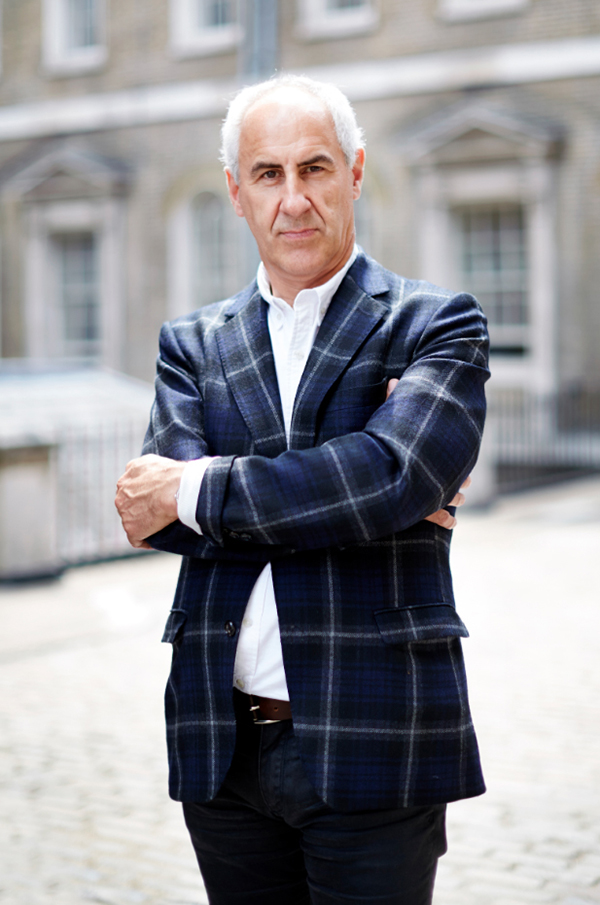On Tuesday night, LCF hosted an intimate Inside the Industry conversation with LCF Head of College, Professor Frances Corner OBE and Simon Ward, Chief Operating Officer of the British Fashion Council, to tell all about his interesting career path and how he got to where he is today.
So how did Simon, who studied Geography at Goldsmiths, end up in fashion?
“I guess by mistake,” he laughs, “because the army didn’t want me”.
It’s true. In fact, so vivid was the five day selection process for a university army cadetship, that a piece on it, which he wrote for his school magazine, became part of the army’s recruitment literature. A little later in life, Simon bumped into an Italian girl (she became his girlfriend for some time) whose opera-obsessed family helped him discover his voice, a voice Simon spent ten years perfecting before taking a job in the menswear department of Selfridges to pay the bills. Following this, Simon joined the British Clothing Industry Association, which he describes as “relatively dull stuff”. He left, only to return shortly afterwards, this time for a role with the newly created British Fashion Council.
All of Simon’s background comes into play as COO of the non-profit BFC. Coming from a military background (his father was in the navy) taught him discipline, and the creativity and demand of being an opera singer gives him a real appreciation of what it’s like to be in the demanding role of a fashion designer.
“Organising the fashion industry is like having a box of frogs in front of you,” explains Simon, who has a huge map of London in front of him at all times when planning London Fashion Week – this must be where the geography degree helps.
In 2010, the British Fashion Council published a report titled ‘The Value of the UK Fashion Industry’ which saliently found fashion to be worth £21bn to the country’s economy. The statistic forever changed the opinions of discerning politicians, bankers and more.
“There are so many walks of life where people are just doing the same thing as always”, says Simon wisely. “Fashion, for all its sins, won’t put up with that. It changes as often as the seasons.”
Simon does warn that creativity must be balanced with business acumen, otherwise one would just be having creative fun. “There’s a price to pay and it’s called hard work” he adds.
The audience was subsequently treated to a short clip, capturing moments from this season’s London Fashion Week (20 – 24 February 2015), accompanied by a voice over from Caroline Rush, a cameo from Imran Ahmed, Editor-in-Chief of Business of Fashion, Jourdan Dunn posing effortlessly, and more.
Professor Corner described the fashion industry as an ecosystem, a joined up industry reliant on all kinds of talent including the development of fabrics. This led Simon to talk about British manufacturing, which is great for high quality niche products, not so much for the mass market goods at high street prices.
He told the audience about English shirt maker Emma Willis who “makes you start dreaming dreams when you meet her” and is determined to increase the amount of manufacturing in the UK.
Fashion can be an agent for all sorts of change and yet, “it has a dark underbelly” said Professor Corner. Her statement was ambiguous but Simon responded by citing Alexander McQueen’s 1996 Dante collection, revealed in a show at a Spitalfields church. “I was uncomfortable with the horns,” he tells, “but the person seated next to me said he was a genius” – 15 years later, the Duchess of Cambridge wore a wedding dress by his eponymous label.
“Fashion is theatre, it’s about telling stories. It’s also an intense industry,” comments Simon, “you have to balance maximising your individuality carefully or you’ll fall off the edge.”
As a graduate in Fashion Journalism, I was keen to know Simon’s thoughts on print journalism, and whether it was a dying trade because of its digital counterpart. “Well once upon a time, they said why bother travelling around the world for fashion week when we can watch it online,” he answered. “Now correct me if I’m wrong but there are now more shows than ever. It’s a similar concept with online and physical fashion retail”.
Simon and his team work hard to support designers. As British Vogue Editor Alexandra Shulman put it in the short LFW clip, “you don’t get the established talent without helping emerging talent”.
In reaction to unpaid internships, the BFC created the school leaver’s apprenticeship programme. It also launched ‘Fashion Forward’ to help provide funding to talented emerging British designers to show and develop their businesses in London.
In 1992 there was a recession, just as several noteworthy designers were emerging (John Richmond for example) which the BFC felt it simply had to support. After pulling together funding, the British Fashion Council put 6 designers up in the Ritz, told them they’d have an audience and said “good luck!”
Throughout the conversation, Simon touches on perseverance, faith and failure. He’s a self-proclaimed failure, as a student, soldier and opera singer, but he concludes with one final piece of advice: “the bigger the failure, the bigger the lesson.”
Words by Veebs Sabharwal, BA (Hons) Fashion Journalism


